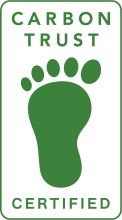UK
UK overview
In 2022, the UK Government Environmental Audit Committee made several recommendations to improve sustainability. These include integrating sustainability considerations into all future trade agreements, nature-proofing foreign investments, and increasing the sustainable use of risk-free commodities. These strategies include incorporating such requirements into government buying standards. The HM Revenue and Customs have a sustainable procurement policy.
In the UK, key areas to achieve competitive advantage in terms of sustainability performance may include energy and water savings, and indoor air quality improvement. There is also a market for sustainable building products, particularly at the cutting edge of lighting. Note that many of the accepted certifications and labels may be common with the EU (see European standards). The following is one example of an existing UK certification scheme.
Carbon Trust Label

This is a voluntary eco-label administered by the Carbon Trust. It was initially set up during the Tony Blair administration. The Carbon Trust works with companies to help them effectively measure, manage and reduce the footprint of their products. They offer the following labels:
- CO2 measured
- Reducing CO2
- Reducing CO2 packaging
- Carbon Neutral
- Carbon Neutral Packaging
- Lower CO2
- 100% renewable energy.
Organisations or products can be certified to PAS 2060, the international standard for carbon neutrality. It is also essential for green bonds assurance. A carbon footprint label certifies that a carbon life cycle assessment (LCA) of the product was done in accordance with internationally recognised standards (PAS 2050, the GHG Product Standard and ISO 14067).
More info: Product carbon footprint label | The Carbon Trust
Green credentials & standards

